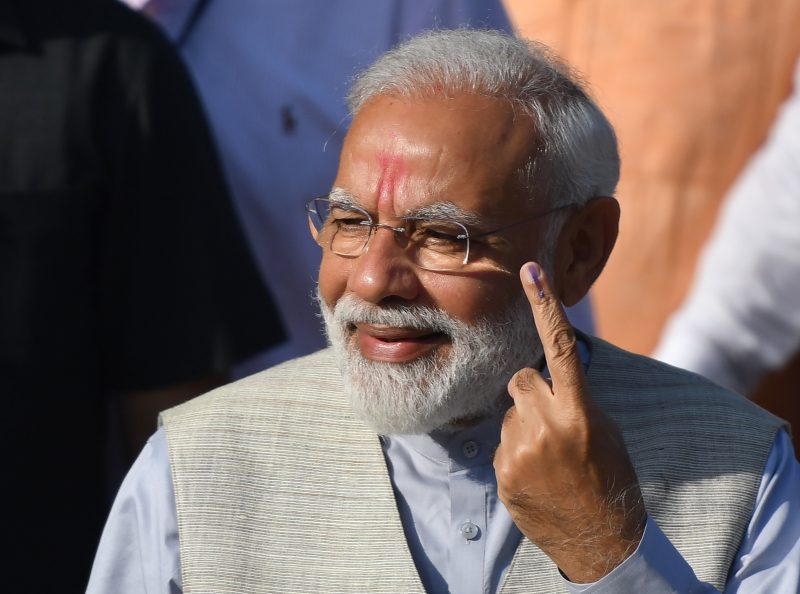Modi among tens of millions to vote in India’s ‘Super Tuesday’ polls
Narendra Modi’s right wing Bjaratiya Janata Party (BJP) is considered the frontrunner in the nationwide vote (PUNIT PARANJPE)
Ahmedabad (India) (AFP) – Tens of millions of Indians, including Prime Minister Narendra Modi, voted on India’s “Super Tuesday” in the latest round of polls when the biggest number of seats are decided in the country’s marathon election.
Nearly 190 million voters were eligible to vote on 117 seats spread across 15 Indian states, stretching from the Himalayas to the Indian ocean, in the third of the seven phases of the mega polls.
Heavy security has been put in place, with violent clashes erupting between rival groups in eastern India’s West Bengal state, killing one political worker.
State election official Amit Yyoti Bhattaharya told AFP that a 30-year-old man was killed in the clashes near a polling booth in Murshidabad region.
Two more people were injured elsewhere in the state in similar clashes.
Suspected Maoists also detonated an improvised explosive device in neighbouring Jharkhand state without causing any damage.
After casting his ballot in his home state of Gujarat, which he ruled for over a decade before leading his party to national power in 2014, Modi compared the experience of voting to the Hindu practice of cleansing sins by bathing in the Ganges river.
“By voting, I feel the same sense of purity that one gets by taking a bath at the Kumbh festival,” he said.
The nationalist leader, who is seeking a second term, met his 98-year-old mother and then waved to supporters from an open top car that took him to vote in Ahmedabad, Gujarat’s main city.
His right-wing Bharatiya Janata Party (BJP) is considered the frontrunner in the vote but faces a significant challenge from regional parties and lead opposition Congress party of Rahul Gandhi.
Modi has made national security and fighting terrorism his main campaign theme to blunt opposition attacks on his handling of the economy.
Many see the election as a referendum on his five-year rule — which has seen impressive economic growth but not the jobs that the BJP promised.
Gujarat sends 26 lawmakers to the Indian parliament and the right-wing BJP won all of those seats in 2014.
Modi voted in the constituency where his close associate Amit Shah, the BJP president and key powerbroker, is contesting his maiden election.
Gandhi is standing in Wayanad in Kerala state, taking a risk as south India is considered a stronghold of regional parties.
The opposition party leader says contesting Wayanad is a sign of his commitment to southern India. His opponents say it shows he fears defeat in his traditional seat in the northern state of Uttar Pradesh.
Under Indian election law, candidates can contest two seats, though they can only keep one if they win both. Gandhi is also on the ballot for Amethi in Uttar Pradesh.
– Round three of seven –
An estimated 60 percent of eligible voters cast a ballot in the third round, according to election authorities, lower than the 70 percent participation in the poll’s two previous phases this month.
Authorities bolstered security in the restive Kashmir valley, where anti-India sentiment and armed militancy often overshadow polling.
Roughly 10 percent of voters turned out in the Anantnag constituency, where polls were open on a truncated schedule for security reasons.
Election results are to be released on May 23 and analysts say Modi is likely to see a repeat of the BJP’s 2014 performance, when the party won 282 seats.
Modi has capitalised on nationalist fervour that followed India’s air strikes on Pakistan in February in a dispute over Kashmir.
India accused its neighbour of harbouring a militant group that claimed a deadly suicide bombing in Kashmir.
The fractured opposition, led by Congress, has sought to attack the government over employment, the economy and a debt crisis for Indian farmers.
strs-ja/sah/gle
Disclaimer: Validity of the above story is for 7 Days from original date of publishing. Source: AFP.


